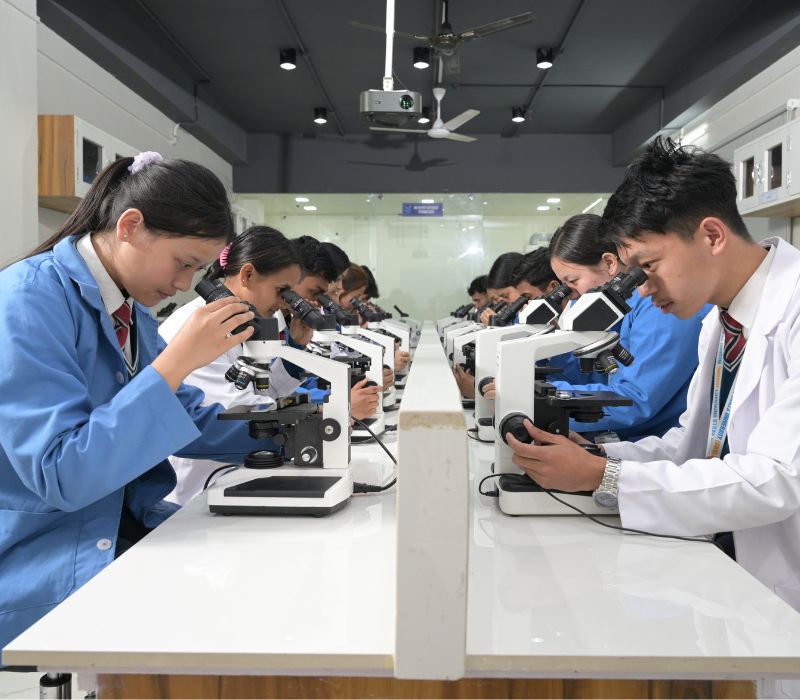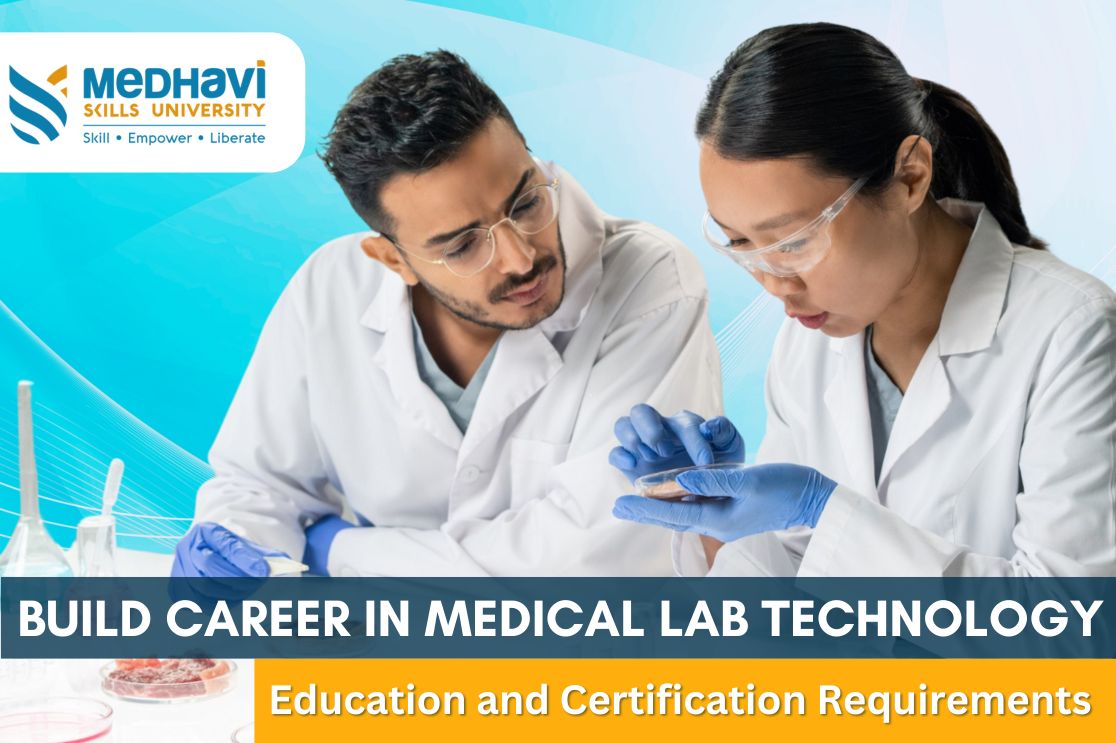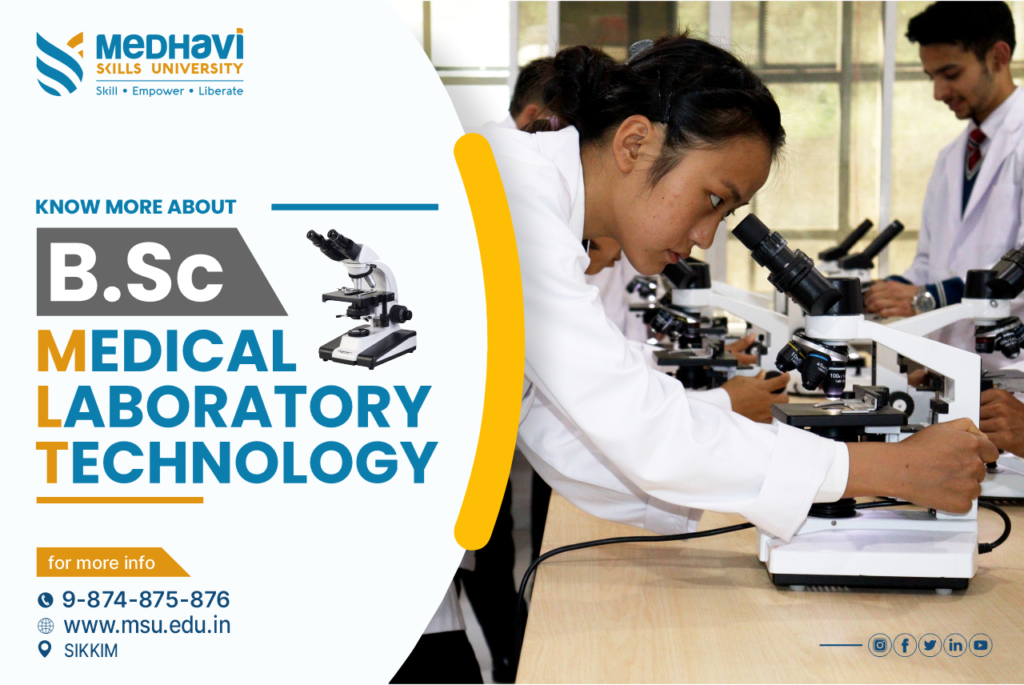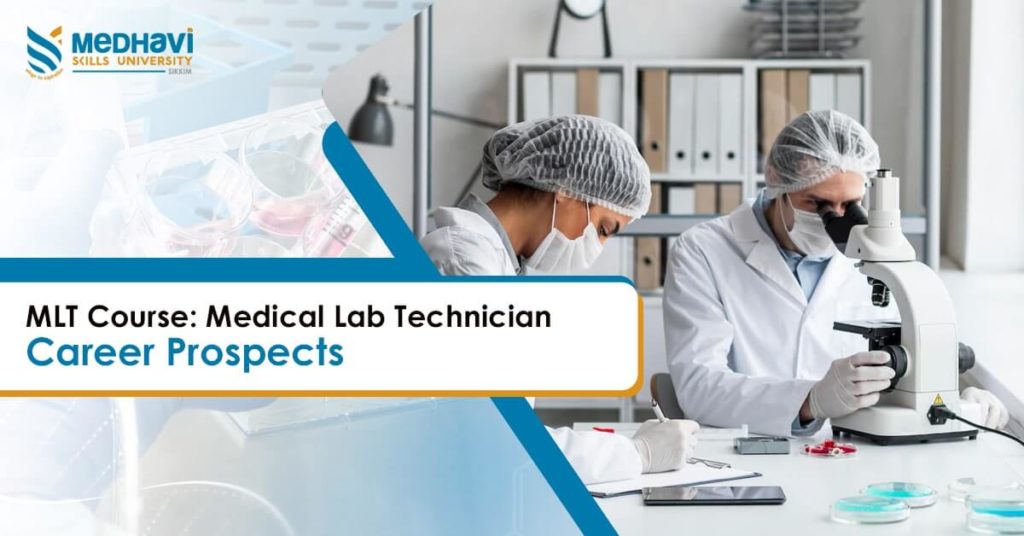Program Overview
A comprehensive curriculum of Medical Lab Technology blending healthcare expertise, management acumen, and industry-focused practical training ensures students are equipped to excel in the evolving healthcare sector
The B.Sc in Medical Laboratory Technology program equips aspiring diagnostic experts with comprehensive training in anatomy, microbiology, biochemistry, and hematology. Offered by the School of Healthcare & Technology, the program combines 70% practical skilling with theoretical knowledge, preparing graduates for proficiency in diverse diagnostic tests. As the global healthcare sector continues to expand, the demand for healthcare professionals has risen accordingly. Modern educational programs are designed to prepare students for diverse roles in hospitals, clinics, research laboratories, and diagnostic facilities. These B.Sc in Medical Lab Technology program focus on patient care, advanced technologies, and effective communication with patients and healthcare professionals. Graduates have the opportunity to specialize in areas such as microbiology, pathology, and biochemistry. If you are looking for a skill-based and employment oriented MLT course, then this program would be an ideal choice for you.


MSU Advantages
The flexible learning design of this healthcare program on Medical Lab Technology also allows personalized education. This makes MSU an ideal choice for future-ready healthcare professionals. Explore some of the advantages of studying Medical Lab Technology at MSU:
Program aligned to NEP 2020
Focus on Learning Outcome Based Education
Industry-Aligned Curriculum
Well-equipped diagnostic laboratories, simulation labs, and industry-integrated training facilities
70% Curriculum includes Skill Component
Hands-On Learning
Learn from seasoned healthcare professionals
Immersive Industry Exposure through industry visits, guest lectures, and networking opportunities
Opportunity to ‘Learn and Earn’ from hospital organizations and earn a great stipend.
Visit renowned hospitals for On-Job-Training
Engage with industry experts providing invaluable insights and real-world perspectives

Do-Experience-Learn
Experience hands-on learning in our Classroom, Radiology Lab, Medical Lab, Microbiology and Biochemistry Lab, Critical Care Unit, Dialysis Unit, Emergency Unit, Pathology Lab, Operation Theatre—where theory meets practice






Eligibility Criteria
For B.Sc. (3 Years): 10+2 (Science with Biology) and B.Sc. (Lateral Entry to 2nd Year): Diploma in relevant discipline
*Note: Duration of this Paramedical Program may be extended by 3 months to 1 year (Approx) as per the guidelines received (if any) in the future from the State Allied and Health Care Council, Sikkim.
Academic Framework
A curriculum designed to build core medical laboratory skills, paired with a clear pathway to diverse global careers
Learning with Industry
Comprehensive curriculum blending hospitality skills, management expertise, and industry-focused practical learning






Steps to Follow for Application





Program Specific Outcomes
A graduate of B.Sc in Medical Lab Technology should be able to:
PSO 1
A Medical Laboratory Technology graduate should possess comprehensive knowledge and a clear understanding of the field within a broad multidisciplinary context. They should be familiar with various learning areas, their connections to related fields, and emerging developments in medical laboratories.
PSO 2
A Medical Laboratory Technology graduate should possess the practical, professional, and procedural knowledge required for skilled tasks, self-employment, and entrepreneurship. This includes expertise in laboratory procedures, enterprise creation, product development, and innovative organizational methods.
PSO 3
A Medical Laboratory Technology graduate should demonstrate expertise in operating lab instruments, precise measurements, phlebotomy, first aid, and medical data analysis in diverse contexts.
PSO 4
Demonstrate the acquisition of the capacity to extrapolate from what has been learned, translate concepts to real-life situations, and apply acquired competencies in new/unfamiliar contexts, rather than merely replicate curriculum content knowledge, to generate solutions to specific problems.
Our Industry Partners
Leading industry partners to provide real world hands-on exposure






Discover the real-world impact of MSU from our students
I'm pursuing my Bachelor's in Medical Laboratory Technology at Medhavi Skills University, and it has been an incredible journey. The internship experience honed my skills in patient communication, handling situations, and performing tests. With knowledgeable and passionate faculty, MSU has given me the perfect platform to explore, experiment, and excel.
Medhavi Skills University is more than an institution—it’s where passion meets practicality. With a strong focus on skill-based education, it empowers students to be future-ready. Beyond technical skills, it fosters critical thinking, problem-solving, and result interpretation—essential for any field. My transformative journey here is a testament to its incredible faculty and learning environment.
Find Quick Answers to Your Concerns










